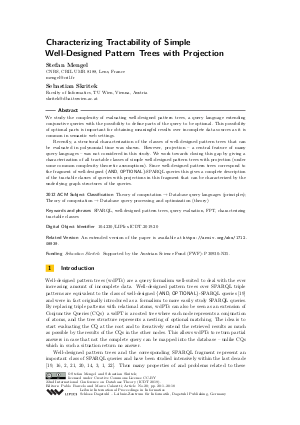Characterizing Tractability of Simple Well-Designed Pattern Trees with Projection
Authors Stefan Mengel, Sebastian Skritek
-
Part of:
Volume:
22nd International Conference on Database Theory (ICDT 2019)
Part of: Series: Leibniz International Proceedings in Informatics (LIPIcs)
Part of: Conference: International Conference on Database Theory (ICDT) - License:
 Creative Commons Attribution 3.0 Unported license
Creative Commons Attribution 3.0 Unported license
- Publication Date: 2019-03-19
File

PDF
LIPIcs.ICDT.2019.20.pdf
- Filesize: 0.62 MB
- 18 pages
Document Identifiers
Related Versions
-
An extended version of the paper is available at https://arxiv.org/abs/1712.08939.
Subject Classification
ACM Subject Classification
- Theory of computation → Database query languages (principles)
- Theory of computation → Database query processing and optimization (theory)
Keywords
- SPARQL
- well-designed pattern trees
- query evaluation
- FPT
- characterizing tractable classes
Metrics
- Access Statistics
-
Total Accesses (updated on a weekly basis)
0PDF Downloads0Metadata Views
Abstract
We study the complexity of evaluating well-designed pattern trees, a query language extending conjunctive queries with the possibility to define parts of the query to be optional. This possibility of optional parts is important for obtaining meaningful results over incomplete data sources as it is common in semantic web settings.
Recently, a structural characterization of the classes of well-designed pattern trees that can be evaluated in polynomial time was shown. However, projection - a central feature of many query languages - was not considered in this study. We work towards closing this gap by giving a characterization of all tractable classes of simple well-designed pattern trees with projection (under some common complexity theoretic assumptions). Since well-designed pattern trees correspond to the fragment of well-designed {AND, OPTIONAL}-SPARQL queries this gives a complete description of the tractable classes of queries with projections in this fragment that can be characterized by the underlying graph structures of the queries.
Cite As Get BibTex
Stefan Mengel and Sebastian Skritek. Characterizing Tractability of Simple Well-Designed Pattern Trees with Projection. In 22nd International Conference on Database Theory (ICDT 2019). Leibniz International Proceedings in Informatics (LIPIcs), Volume 127, pp. 20:1-20:18, Schloss Dagstuhl – Leibniz-Zentrum für Informatik (2019)
https://doi.org/10.4230/LIPIcs.ICDT.2019.20
BibTex
@InProceedings{mengel_et_al:LIPIcs.ICDT.2019.20,
author = {Mengel, Stefan and Skritek, Sebastian},
title = {{Characterizing Tractability of Simple Well-Designed Pattern Trees with Projection}},
booktitle = {22nd International Conference on Database Theory (ICDT 2019)},
pages = {20:1--20:18},
series = {Leibniz International Proceedings in Informatics (LIPIcs)},
ISBN = {978-3-95977-101-6},
ISSN = {1868-8969},
year = {2019},
volume = {127},
editor = {Barcelo, Pablo and Calautti, Marco},
publisher = {Schloss Dagstuhl -- Leibniz-Zentrum f{\"u}r Informatik},
address = {Dagstuhl, Germany},
URL = {https://drops.dagstuhl.de/entities/document/10.4230/LIPIcs.ICDT.2019.20},
URN = {urn:nbn:de:0030-drops-103220},
doi = {10.4230/LIPIcs.ICDT.2019.20},
annote = {Keywords: SPARQL, well-designed pattern trees, query evaluation, FPT, characterizing tractable classes}
}
Author Details
Funding
- Skritek, Sebastian: Supported by the Austrian Science Fund (FWF): P30930-N35.
References
-
Marcelo Arenas, Gonzalo I. Diaz, and Egor V. Kostylev. Reverse Engineering SPARQL Queries. In Proc. WWW 2016, pages 239-249. ACM, 2016.

-
Marcelo Arenas and Jorge Pérez. Querying semantic web data with SPARQL. In Proc. PODS 2011, pages 305-316. ACM, 2011.

-
Pablo Barceló, Markus Kröll, Reinhard Pichler, and Sebastian Skritek. Efficient Evaluation and Static Analysis for Well-Designed Pattern Trees with Projection. ACM Trans. Database Syst., 43(2):8:1-8:44, 2018.

-
Hubie Chen. The tractability frontier of graph-like first-order query sets. In Thomas A. Henzinger and Dale Miller, editors, Proc. CSL-LICS 2014, pages 31:1-31:9. ACM, 2014.

-
Hubie Chen and Víctor Dalmau. Decomposing Quantified Conjunctive (or Disjunctive) Formulas. In Proc. LICS 2012, pages 205-214. IEEE Computer Society, 2012.

-
Hubie Chen and Dániel Marx. Block-Sorted Quantified Conjunctive Queries. In Fedor V. Fomin, Rusins Freivalds, Marta Z. Kwiatkowska, and David Peleg, editors, Proc. ICALP 2013, volume 7966 of Lecture Notes in Computer Science, pages 125-136. Springer, 2013.

-
Arnaud Durand and Stefan Mengel. Structural Tractability of Counting of Solutions to Conjunctive Queries. Theory of Computing Systems, pages 1-48, 2014.

-
Jörg Flum and Martin Grohe. Parameterized Complexity Theory. Texts in Theoretical Computer Science. An EATCS Series. Springer, 2006.

-
Martin Grohe. The Parameterized Complexity of Database Queries. In Peter Buneman, editor, Proc. PODS 2001, pages 82-92. ACM, 2001.

-
Martin Grohe. Parameterized Complexity for the Database Theorist. SIGMOD Record, 31(4):86-96, 2002.

-
Martin Grohe. The complexity of homomorphism and constraint satisfaction problems seen from the other side. Journal of the ACM, 54(1), 2007.

-
Martin Grohe, Thomas Schwentick, and Luc Segoufin. When is the evaluation of conjunctive queries tractable? In Jeffrey Scott Vitter, Paul G. Spirakis, and Mihalis Yannakakis, editors, Proc. STOC 2001, pages 657-666. ACM, 2001.

-
Mark Kaminski and Egor V. Kostylev. Beyond Well-designed SPARQL. In Proc. ICDT 2016, volume 48 of LIPIcs, pages 5:1-5:18. Schloss Dagstuhl - Leibniz-Zentrum fuer Informatik, 2016.

-
Egor V. Kostylev, Juan L. Reutter, and Martín Ugarte. CONSTRUCT queries in SPARQL. In Proc. ICDT 2015, volume 31 of LIPIcs, pages 212-229. Schloss Dagstuhl - Leibniz-Zentrum fuer Informatik, 2015.

-
Markus Kröll, Reinhard Pichler, and Sebastian Skritek. On the Complexity of Enumerating the Answers to Well-Designed Pattern Trees. In Proc. ICDT 2016, volume 48 of LIPIcs, pages 22:1-22:18. Schloss Dagstuhl - Leibniz-Zentrum fuer Informatik, 2016.

-
Andrés Letelier, Jorge Pérez, Reinhard Pichler, and Sebastian Skritek. Static analysis and optimization of semantic web queries. ACM Trans. Database Syst., 38(4):25, 2013.

-
Dániel Marx. Tractable hypergraph properties for constraint satisfaction and conjunctive queries. In Leonard J. Schulman, editor, Proc. STOC 2010, pages 735-744. ACM, 2010.

-
Christos H. Papadimitriou and Mihalis Yannakakis. On the Complexity of Database Queries. J. Comput. Syst. Sci., 58(3):407-427, 1999.

-
Jorge Pérez, Marcelo Arenas, and Claudio Gutierrez. Semantics and complexity of SPARQL. ACM Trans. Database Syst., 34(3), 2009.

-
François Picalausa and Stijn Vansummeren. What are real SPARQL queries like? In Proc. SWIM 2011, page 7. ACM, 2011.

-
Reinhard Pichler and Sebastian Skritek. Containment and equivalence of well-designed SPARQL. In Proc. PODS 2014, pages 39-50. ACM, 2014.

-
Miguel Romero. The Tractability Frontier of Well-designed SPARQL Queries. In Proc. PODS 2018, pages 295-306. ACM, 2018.

